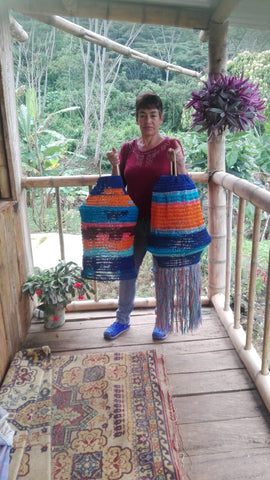Meet the Artisans
The word 'Artisan' in Colombia represents highly skilled craftspeople who have learned their skills and techniques, from their own family, in their own home.
Most artisans have had little education yet they proudly operate their own traditional businesses.
As their businesses are their main source of income to support their families, they work tirelessly to overcome many obstacles to achieve their dreams of being valued and economically independent.
Casa Bonita’s purpose is to:
- respect and work with the Artisans traditional business model
- economically empower Artisans and Indigenous women and their businesses
- encourage creativity of each Artisan’s skills through collaborations in designing and curating our exclusive one-of-a-kind collections
- assist in preserving the Artisans traditional techniques, so they impart to future generations
- teach the Artisans export procedures and to share our alliances and supply chain
Casa Bonita is committed to connecting our customers with each Artisan; their products, culture, traditions, families and dreams!
Supporting Casa Bonita gives YOU:
- Power to positively impact the lives of 100’s of Indigenous communities
- Peace of Mind that artisans are paid a fair price for their products
- Insight into their culture and businesses, enabling longevity of their traditions
- Knowledge that all products are ethical, sustainable and cruelty free
- Good Karma for supporting women both in South America and Australia …and a colourful, unique and authentic shopping experience!
Luz Marina Umaña
Briceño, Boyaca, Colombia

Luz Marina is a master Artisan of hand crocheting and hand looming with Fique Agave.
She specialises in creating unique colour combinations, organic textures, and traditional shapes, all with a contemporary aesthetic.



Materials:
Fique Agave threads
Products:
Baskets
Tote Bags
Placemats
Trays
Lamp shades
Gift Hampers
Ethically and Sustainably Sourced:
Fique Agave is a natural fibre that grows in the leaves of the native Agave cactus in the Andean regions of Colombia.
The Fique Agave plant is naturally sustainable with a productive lifetime of 15-20 years. as the leaves are only harvested from the base, allowing the plant to grow and thrive.
Fique Agave handicrafts date back a thousand years to the ‘Guane’ tribes.
The fibres are dried, hand combed, dyed with naturally extracted dyes, before being handwoven on a traditional loom or hand crocheted into timeless, unique and versatile fashion accessories and homewares.
Fique is more eco-friendly than other natural fibres as it does not contaminate water, and requires much less water to process it into usable threads. The fibre is also bio-degradable, so when decomposed, it can be used as compost and fertilizer.
Casa Bonita deals directly and respectively with the Artisans and payments are made both on ordering and completion of orders.
All Fique Agave products are made exclusively by hand using traditional techniques, eliminating any machine emissions.
About 70,000 families of farmers live from the Fique Agave plant and the sale of its fibre, creating wide-spread and positive social and economic impact.
Fique Agave fibre advantages are both environmental and sustainable economics.

Interview 2022
Is it a family business? Do you employ other people or do you buy from other Artisans?
I employ other craftswomen when I have enough orders, but if I can handle the orders, I do it on my own.
What technique do you use? Detail the process and tell us what makes these products so unique.
Not many people make lampshades, because they make backpacks, bags and rugs only in ‘Curití’. For the lampshades, I make the bases (metallic hoops) and work with fique with the colours that the person wants. In addition, all my products are handmade, with much dedication and love.
To obtain the threads, the fique stalk is cut when it is ripe, it is passed through a lathe to remove the green and make it white. It is washed and then dried in the sun. And that’s when it’s ready to be dyed with plant seeds brought from the Amazon. It is washed again and dried with a little softener. It is sent to spin with a lathe, the women take out the threads, and the cone is made, ready to weave.
What materials do you use?
I use "fique" (a natural fibre from a plant) and metal rings for the base of the lamps.
Do you impact the community? How?
I empower women by giving them work. In Barrancabermeja I have given workshops and courses about “fique” weaving with hand crochet to 210 women.
How many people benefit from Casa Bonita's purchases?
My household of 3 people. Employed women.
Social Impact:
- provides financial security to Artisans and Indigenous tribes and their families
- empowers women’s economic independence
- evokes self value and quality of life for the Artisans
- creates legitimate employment opportunities for their communities
- supports environmentally friendly business practices
- encourages creativity, and a sense of personal and group pride
- acknowledges cultural identity and traditions
- preserves and shares Ancestral and Indigenous techniques for future generations



